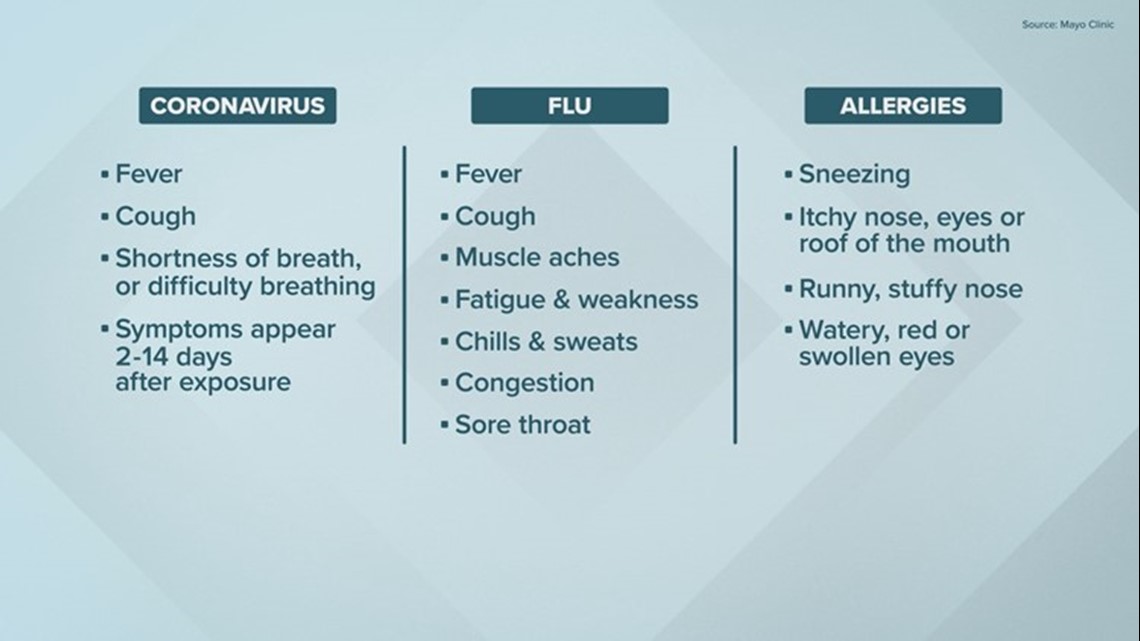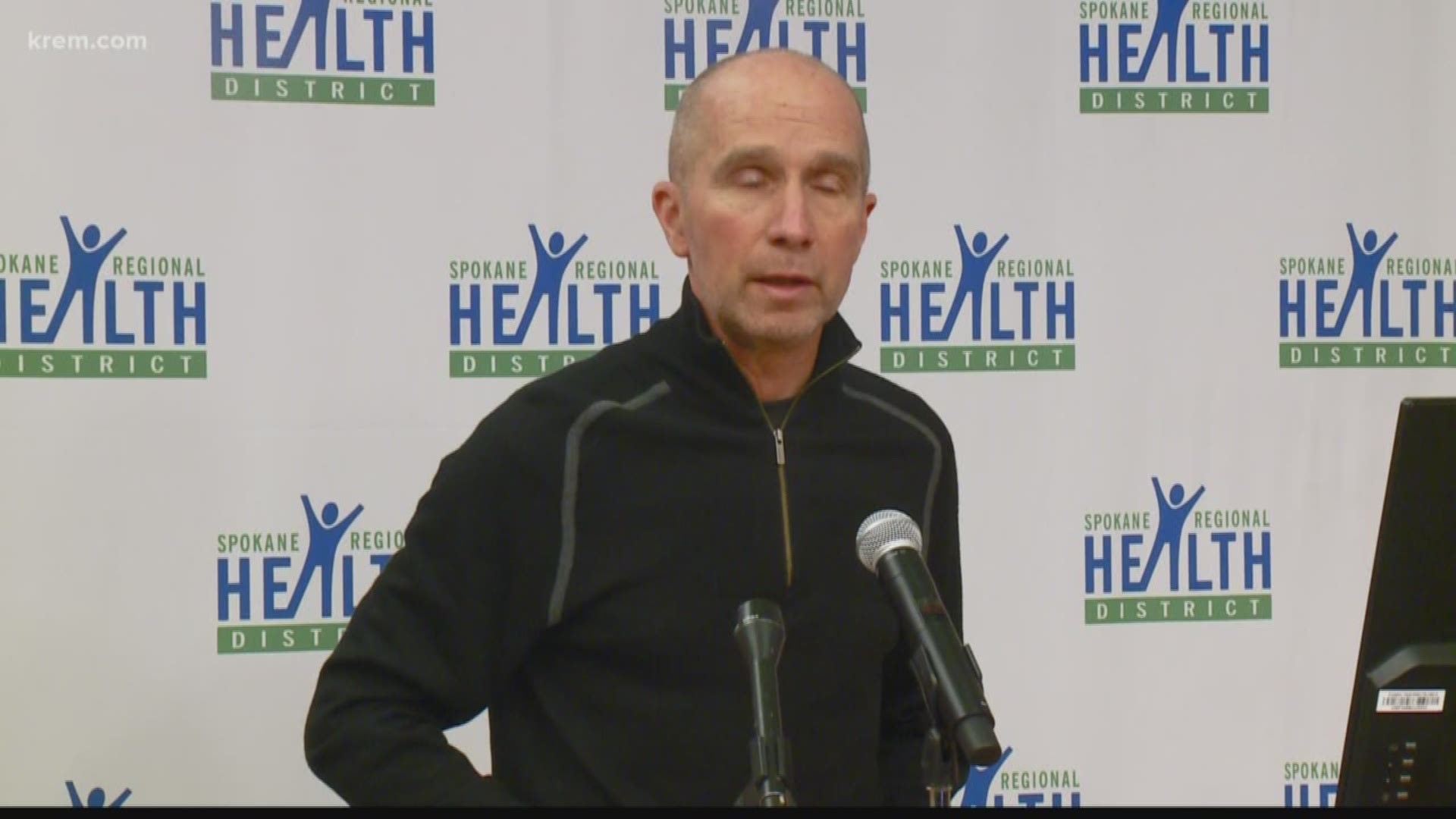Editor's note: Above video was published when first three cases of COVID-19 were announced in Spokane County
SPOKANE, Wash. — Spokane County has 16 total cases of coronavirus (COVID-19) among 1,524 cases in Washington as of Saturday.
The Spokane Regional Health District is identifying and contacting people who may have had contact with the individuals. They will be monitored for fever and respiratory symptoms.
No deaths from coronavirus have occurred in Spokane County as of Saturday. Statewide, there have been 83 deaths from the virus.
So far, 21,719 people have tested negative. This represents 93 percent of all tests done in the state as of Friday.
The person with the ninth confirmed case of coronavirus in Spokane County lives at a retirement home in Spokane Valley, according to Kelli Hawkins of the Spokane Regional Health District.
That person is currently in isolation in their apartment at Holman Gardens. Hawkins says staff are taking precautions and following guidelines issued by the health district and Governor Jay Inslee.
The Spokane Regional Health District is identifying and contacting those who may have come in contact with the newest infected individuals. They will be monitored for fever and respiratory symptoms.
Gov. Jay Inslee signed five coronavirus relief bills Tuesday, including a measure allocating $200 million in emergency funding. The money, which the state Legislature approved last week, could go toward setting up quarantine sites, freeing up hospital beds, and aiding businesses negatively impacted by the virus.
Inslee said it was "very possible" the state could need additional appropriations.
He also ordered a temporary shutdown of restaurants, bars, theaters and clubs as the state fights a coronavirus outbreak. Restaurants will be allowed to have take-out and delivery services, but no in-person dining. Gatherings are also expected to be further limited to 50 people.
The City of Spokane announced on Monday that Mayor Nadine Woodward has decided to halt water shut-offs during the COVID-19 outbreak, commonly known as coronavirus.
The city is also suspending late fees until further notice, according to a press release.
Residents still must pay their utility bills, but arrangements can be made and relief is being provided through funds donated to the U-Help program, according to the city.
Schools across Washington State are also closed until April 24.
One person who tested positive for the virus is a woman in her 40s who is displaying symptoms of the virus, said Spokane County Health Officer Dr. Bob Lutz. One of the other people who tested positive is a man in his 50s.
Lutz said a third person who tested positive for the virus had not been contacted by health officials. Each contact investigation takes 30 minutes to one hour.
One person who tested positive for the virus did not travel but Lutz believes they may have had contact with someone in the Seattle area.
“All three individuals, to the best of my knowledge, are not necessarily requiring hospitalization," Lutz said at a press conference last weekend.
Some school district leaders announced over the weekend that people who tested positive have ties to area schools.
A parent at Bemiss Elementary is among those who tested positive for COVID-19, along with a robotics team adviser who worked in the Medical Lake School District.
FIRST Washington posted on its website that a mentor from a robotics competition team has tested positive for COVID-19.
The mentor attended the Glacier Peak Week 1 and West Valley Week 2 events. The event at West Valley High School in Spokane Valley was held from March 5-7.
Lutz said anyone who tests positive for the virus is told to self-isolate if they are not sick enough to be hospitalized.
Lutz added that the turnaround time on the first test in Spokane County was three days, which he called "encouraging."
At a previous press conference, Lutz said he knew the virus was in Spokane County but health leaders did not yet have documentation to prove it. He addressed that again on Saturday.
“We see this spreading throughout the entire state and I think that, as I mentioned before, I knew that it was here but I didn’t have confirmation that it was here," Lutz said on Saturday.
Some people have expressed concerns about whether hospitals in the area are equipped to deal with the virus. Lutz responded to these fears by saying hospitals in our area have the capacity right now and health leaders are working to prevent them from being overwhelmed.
Those who have scheduled elective surgeries at area hospitals should consider postponing them, Lutz said.
We need to be practicing social distancing, Lutz says
“Social distancing is something we need to be looking at, we need to be practicing," Lutz said.
This means staying away from other people as a way to protect oneself and others from getting sick.
RELATED: What is social distancing?
“We want people to continue to go about their daily activities, acknowledging that they’ll have to do their daily activities somewhat differently," Lutz said. "This does not mean stockpiling resources. It really means looking at doing things a little bit differently."
Sheriff activates emergency operations center
Sheriff Ozzie Knezovich, as the Director of Greater Spokane Department of Emergency Management, announced on Friday the immediate activation of the Emergency Operation Center.
He also called for a meeting of all stakeholders on Monday, March 16, 2020, to discuss coordinated effort to assist and ensure the welfare of our community.
Another coronavirus patient released
Kelli Hawkins, a spokesperson for the health district, said another coronavirus patient who was receiving treatment in Providence Sacred Heart Medical Center's Special Pathogens Unit has been released after two tests for the virus came back negative.
One person is still receiving treatment and is in satisfactory condition, Hawkins said.
Four coronavirus patients were brought to Sacred Heart on Feb. 19 from Travis Air Force Base in Northern California. The patients were passengers on the Diamond Princess cruise ship.
What are coronavirus symptoms?
The symptoms of coronavirus are similar to the flu or colds. Symptoms include a fever, cough, and shortness of breath or difficulty breathing, according to the Washington State Department of Health.
The severity of symptoms ranges significantly. Some cases are very mild with symptoms similar to the common cold, and some cases are more like severe pneumonia that require hospitalization.
Most deaths have been reported in older adults who had other health conditions, according to DOH.
Symptoms may appear as soon as two days after being exposed to the coronavirus or as long as 14 days.
A Washington state call center has been set up to answer your questions about COVID-19. If you have questions about how the virus spreads, what is being done in Washington state, and what you can do if you have symptoms, call 1-800-525-0127 and press #.


How to stay healthy: Advice from the Spokane Regional Health District
- Stay home when you are sick. Staying home when ill prevents the spread of infections to others.
- Use good respiratory etiquette and hand hygiene in all community settings, including homes, childcare facilities, schools, workplaces and other places where people gather. Cover your coughs and sneezes with a tissue and put the used tissue in a waste basket. If you don’t have a tissue, cough or sneeze into your upper sleeve, not your hands.
- Wash your hands often and thoroughly with soap and water for at least 20 seconds or use an alcohol-based hand sanitizer (with at least 60-95% alcohol) if you can’t wash.
- Avoid touching your eyes, nose or mouth: Germs often spread when a person touches something that is contaminated with germs and then touches his or her eyes, nose or mouth.
- Practice other good health habits: Clean and disinfect frequently touched surfaces at home, work or school, especially when someone is ill. Get plenty of sleep, be physically active, manage your stress, drink plenty of fluids and eat nutritious food.
- Have contingency plans for your family in the case of school closures. Ask your employer about working from home, not only to prepare for school closures, but also to prevent possible exposure.
- Support each other, regardless of race, ethnicity or nationality, and including individuals who have become ill. Show compassion and support for individuals and communities most closely impacted and anyone who might be sick.
- Do you have travel plans? Take time to read the CDC’s guidance on travel (available on SRHD.org) to see how your plans may be affected.


